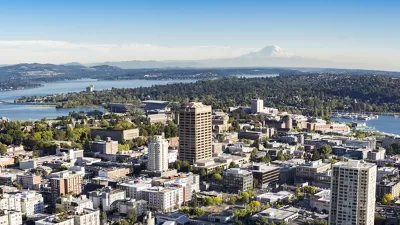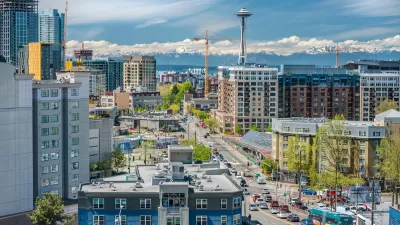An amendment increasing affordability requirements to 60% for housing built on church-owned property has come under fire from Black church leaders who call it a death knell for many affordable housing projects.

An amendment to new density bonus legislation in Seattle has come under fire from Black church leaders, who say that the reduced AMI requirement spells failure for many church-owned developments, writes Natalie Bicknell. "The legislation, which provides density bonuses (i.e., development capacity increases) to religious institutions seeking to build affordable housing on land they own or control, was supposed to be a way for Black churches to create homes for members of their communities impacted by displacement. But an amendment sponsored by Councilmember Lisa Herbold (District 1, West Seattle) deepening affordability requirements from 80% to 60% or less of area median income (AMI) has stirred up uncertainty."
Donald King, president and chief executive officer of the Nehemiah Initiative Seattle, called the change "a poison pill" that excludes the very households it was meant to benefit. "Modest Black churches and small BIPOC-led development firms simply cannot build to this level of affordability. The amendment is another action in the decades of well-intentioned measures that do more harm than good to the financial growth and independence of the Black community." The bill, HB 1377, "requires that cities grant density bonuses in the form of increased maximum building heights, density, and/or floor area limits to property owned or controlled by religious institutions in exchange for the development of affordable housing." Tenants "may not be charged rents exceeding 30% of their annual incomes" for rental units.
"In order to avoid disrupting development plans already in the works, the 60% AMI requirement will not come into effect until July 2022. Additionally, affordable housing projects receiving funding from the City of Seattle already have to meet the 60% AMI requirement per existing policy from the Office of Housing (OH)."
Councilmembers who supported the amendment argued that "prices at the 80% AMI threshold were comparable to market rate housing prices" and, to receive the exemption, churches must do more to ensure the housing they build goes to the neediest families. But "[a]ccording to the development scenarios conducted by the UW, the majority of the developments that are financially viable at 80% AMI, simply do not pencil out at 60%, a difference King describes as 'stark.'" With the 80% AMI requirement, analysis shows that "a typical church with 5,000 square feet of extra land could build an 18-unit family housing project which would cover its costs and earn about a 4.2% per year yield before interest. The same project targeting 60% AMI would yield only 2.9%," a discrepancy that could mean the difference between profitability and bankruptcy.
FULL STORY: Seattle Black Faith Leaders Urge Mayor Durkan Not to Sign Amended Density Bonus Bill

Planetizen Federal Action Tracker
A weekly monitor of how Trump’s orders and actions are impacting planners and planning in America.

San Francisco's School District Spent $105M To Build Affordable Housing for Teachers — And That's Just the Beginning
SFUSD joins a growing list of school districts using their land holdings to address housing affordability challenges faced by their own employees.

The Tiny, Adorable $7,000 Car Turning Japan Onto EVs
The single seat Mibot charges from a regular plug as quickly as an iPad, and is about half the price of an average EV.

San Diego Votes to Rein in “Towering” ADUs
City council voted to limit the number of units in accessory buildings to six — after confronting backyard developments of up to 100 units behind a single family home.

Texas Legislature’s Surprising Pro-Housing Swing
Smaller homes on smaller lots, office to apartment conversions, and 40% less say for NIMBYs, vote state lawmakers.

Even Edmonton Wants Single Staircase Buildings
Canada's second most affordable major city joins those angling to nix the requirement for two staircases in multi-family buildings.
Urban Design for Planners 1: Software Tools
This six-course series explores essential urban design concepts using open source software and equips planners with the tools they need to participate fully in the urban design process.
Planning for Universal Design
Learn the tools for implementing Universal Design in planning regulations.
Borough of Carlisle
Smith Gee Studio
City of Camden Redevelopment Agency
City of Astoria
Transportation Research & Education Center (TREC) at Portland State University
City of Camden Redevelopment Agency
Municipality of Princeton (NJ)





























